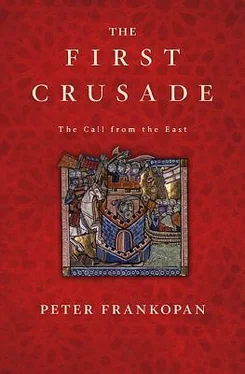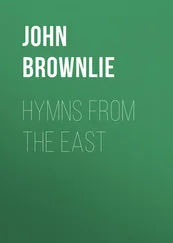But while there was an enormous amount to be gained from the Crusade, Alexios and Urban were also taking a huge risk: in unleashing the Crusade they were creating a movement that they could not necessarily control. Anna Komnene’s account of the start of the Crusade provides a jolting reminder of this dilemma. The emperor, she writes, was disturbed by reports that countless armies from the west were heading for Byzantium: 78‘full of enthusiasm and ardour they thronged every highway, and with these warriors came a host of civilians, outnumbering the sand of the seashore or the stars of heaven, carrying palms and bearing crosses on their shoulders. There were women and children too, who had left their own countries. Like tributaries joining a river from all directions, they streamed towards us in full force’. 79This was not the disciplined and effective fighting force the emperor had expected. Had something gone wrong?
Alexios and Urban had played a dangerous game. The violent passions stoked up by the crusading propaganda were not easy to control; for all the logistical planning and nuanced political calculations, the raw enthusiasm for the Crusade was overwhelming. As tales of Muslim oppression and news of the expedition spread, it became impossible to control the message: Urban II was not the only charismatic figure who was preaching the Crusade in 1095–6. Peter the Hermit, a preacher from Amiens in northern France, capitalised on the excitement and the furore about the suffering of Christians in the east to unleash a People’s Crusade – the dangerously chaotic force described by Anna Komnene. As the western forces moved towards the great imperial city of Constantinople, Alexios needed to assert his authority. His reaction to the People’s Crusade, and the network of allegiances and relationships that were forged with the vanguard of the expedition proper, were to shape the future of crusading.
Contemporaries described Peter as ‘a famous hermit, held in great esteem by the lay people, and in fact venerated above priests and abbots for his religious observance because he ate neither bread nor meat – though this did not stop him enjoying wine and all other kinds of food whilst seeking a reputation for abstinence in the midst of pleasures’. 1Walking barefoot, Peter was a persuasive teacher travelling around the Rhineland, a region neglected by the Pope, who did not try to look for support in lands that were subject to Henry IV. 2Peter spread horrific tales about conditions in the east, sometimes telling his rapt audiences that he had suffered personally at the hands of the Turks during a recent pilgrimage to Jerusalem. Although it seems unlikely that he had ever been to the Holy Land, he claimed that he had met the Pope on his way home, and also that he brought with him appeals from the patriarch of Jerusalem. Like Urban, he found that his calls to action fell on fertile ground. 3
Unlike the Pope, however, his appeals had no structure. Where Urban planned matters carefully – seeking out powerful magnates who would bring substantial contingents with them, limiting participation to those with military experience and insisting on oaths to formalise inclusion in the expedition – Peter did nothing of the sort. There was no set date for departure; nor was there a selection or screening process of who should or should not make the journey. The result was a free-for-all. As one commentator put it, ‘in response to [Peter’s] constant urging and calling, firstly bishops, abbots, clerics, monks; then the most noble laymen, princes of different domains, and all the common people, as many sinful as pious men, adulterers, murderers, thieves, perjurers and robbers; that is to say every sort of people of Christian faith, indeed even the female sex, led by repentance, all flocked joyfully to this expedition’. 4
At the start of 1096, groups of knights began to set off from the Rhineland, accompanied by clerics, the elderly, women and children; it was this first tide that became known as the People’s Crusade. Recent scholarship has sought to rebalance this impression of utter chaos, emphasising the competence of some of those who took part, and pointing out that the motley collection gathered by Peter the Hermit did include some minor aristocrats and independent knights. 5Nevertheless, not only did this scheme to journey to the Holy Land lack the approval of the church, it was markedly different from the detailed plans put into place by Urban and Alexios .
With no significant leadership, chaos ensued. Those inspired by Peter set off at their own pace, oblivious to or disregarding the official departure date set by the Pope. Whipped into a frenzy of excitement about the journey, with vivid stories of atrocities in the east ringing in their ears, and apocalyptic prophecies haunting and spurring them on at the same time, it was not long before they found their first victims: ‘Whether by a judgement of the Lord, or by some error of mind, they rose in a spirit of cruelty against the Jewish people scattered throughout these cities and slaughtered them without mercy ... asserting it to be the beginning of their expedition and their duty against the enemies of the Christian faith.’ 6
Horrific massacres accompanied the progress of the People’s Crusade as it passed through Germany; the Jewish populations in Cologne and Mainz became the victims of breathtaking violence. So shocking was the terror unleashed that in some cases, people took their own lives: ‘The Jews, seeing how the Christian enemy were rising up against them and their little children and were sparing none of any age, even turned upon themselves and their companions, on children, women, mothers and sisters and they all killed each other. Mothers with children at the breast – how horrible to relate – would cut their children with knives, would stab others, preferring that they should die thus at their hands, rather than be killed by the weapons of the uncircumcised.’ In other locations, such as in Regensburg, the Jews were at least spared death; but they were driven into the river Danube where they were forcibly baptised. 7
The anti-Semitism spread. When Godfrey of Bouillon set out in the summer of 1096, he vowed to eradicate the Jews; he was only stopped from doing so after being warned by Henry IV that no hostile steps should be taken against anyone in his realm without his explicit authority. Such was the revulsion towards Godfrey that one Jewish contemporary prayed that his bones be ground to dust. 8This surge in anti-Semitism as a result of the Crusade was not confined to the Rhineland; there were also cases of violence in France threatening to turn into wholescale massacres of Jewish communities. 9
Many contemporaries were appalled. One writer noted that those involved in the persecution of the Jews were threatened with excommunication and with serious punishment by the leading magnates – though neither seems to have had any effect. 10These German thugs, wrote Guibert of Nogent, represented the very worst of society; they were the faeces of the peoples of Europe. 11
This view was echoed in Constantinople. Alexios had asked for, and was expecting, experienced fighting men to arrive in Byzantium towards the end of 1096, in accordance with the timetable set out by the Pope. He was startled not just by the fact that the first waves to reach the empire arrived months too early; it was also apparent that many of those who had come were completely incapable of taking on the Turks, let alone mounting a siege of the towns of Asia Minor. It is hardly surprising that, in the words of Anna Komnene, ‘he dreaded their arrival’. 12
As the many groups making up the People’s Crusade approached Constantinople, anxiety grew. Appalling acts of violence were committed as the first of the armed pilgrims neared the Byzantine frontier in the spring of 1096. The commander of the Hungarian army, a distinguished figure with dazzling snow-white hair, was beheaded after being sent by the king to escort the pilgrims safely across his territory. 13The cocktail of religious fervour, excitement and ill discipline proved even more volatile when the first elements reached Belgrade, the empire’s westernmost entry point on the Danube. Caught off guard, the Byzantine authorities struggled to deal with the situation. The sale of provisions was banned outright by imperial officials so supplies could be hastily rationalised. This provoked an immediate reaction from the westerners who went on the rampage, sacking the surroundings of Belgrade in anger. Calm was finally restored, but only after the Byzantine garrison secured the town by using force against the rioters. Once enough provisions had been organised, a market was opened up which appeased the jumpy wouldbe Crusaders. 14
Читать дальше











